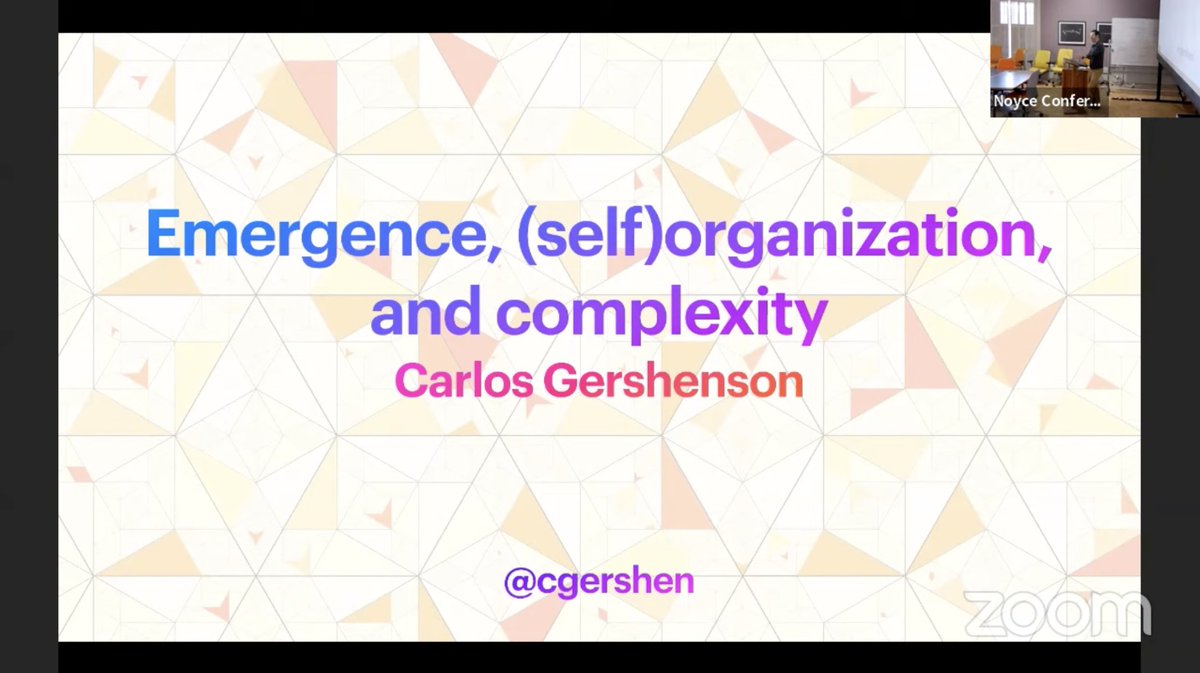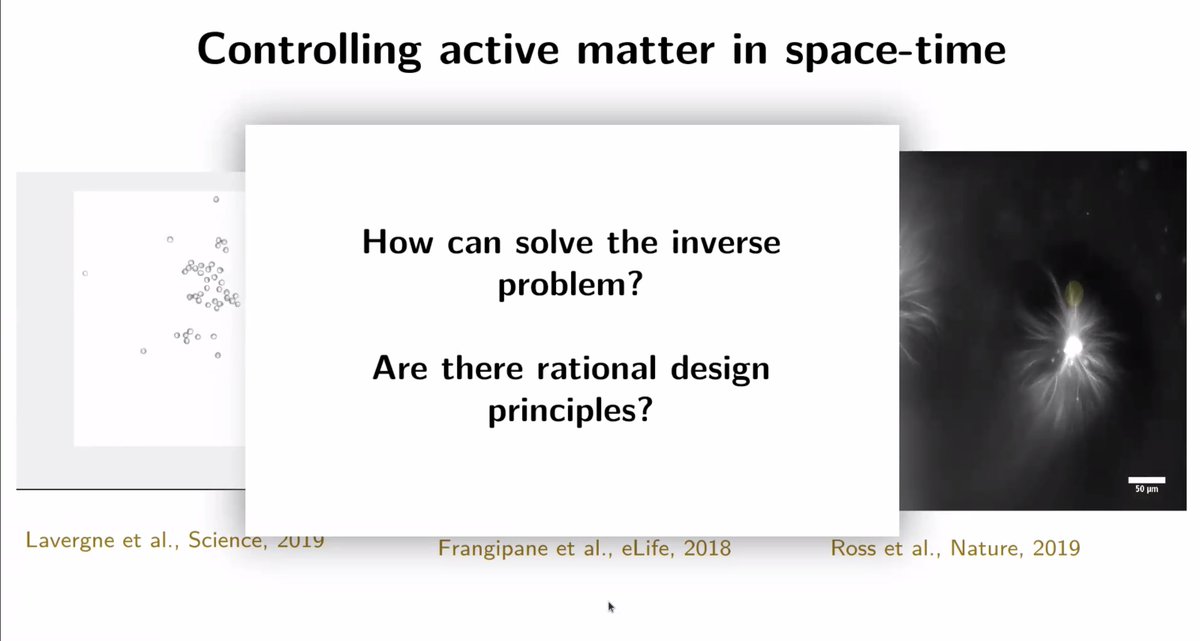
"The 21st Century Question: Emergently Engineering the Future"
Follow this 🧵 today and tomorrow for highlights from our 2022 #AppliedComplexity Network and Board of Trustees Symposium:
santafe.edu/events/annual-…
#Web3 #Cities #Polarization #EmergentEngineering #Decentralization
Follow this 🧵 today and tomorrow for highlights from our 2022 #AppliedComplexity Network and Board of Trustees Symposium:
santafe.edu/events/annual-…
#Web3 #Cities #Polarization #EmergentEngineering #Decentralization

We start with a talk by SFI President David Krakauer:
"Would anyone care to guess why we're so GOOD at building transistors and so CRAP at designing drugs?"
"This thing [points to transistor] lives in a centralized system. This thing [points to cancer drug] lives in US."



"Would anyone care to guess why we're so GOOD at building transistors and so CRAP at designing drugs?"
"This thing [points to transistor] lives in a centralized system. This thing [points to cancer drug] lives in US."




"I'm going to pick on economics, because we like to do that at SFI. 'Ooh, look at that cover! So techy. Global, heat maps...' But here's 'Networks' [in the textbook]. THAT'S IT. Here's '#ComplexityEconomics.' NOTHING." 



"We at SFI have a textbook [via @coreeconteam] that includes ALL of the things that I just listed. Sam Bowles' pitch for the textbook is, 'Economics as if the 20th Century happened.'"
core-econ.org/project/core-t…
core-econ.org/project/core-t…
"Causality is complex...you use adaptation to your advantage, not just try to get rid of it. #EmergentEngineering [makes] a MINIMAL mechanism that coordinates with MAXIMAL adaptive systems...it's a collaboration between classical engineering and [#ComplexityScience." 



"The basic idea that [@kahneman_daniel and his co-authors] suggest is that there's a target, that you know what it is, that there's an optimal policy, and a coordinated team. I don't know what kind of world that is, in which this is true." 



"The way that WE treat this at SFI is different: it's optimal search in dynamic adaptive landscapes — a tradeoff between exploration, exploitation, and competition. There's one VERY NARROW case in which [Kahneman et al.] are right." 





#EmergentEngineering applied to #medicine:
"You might say, 'Those things on the right aren't 'medicine.' You know why you say that? Because they're much more complex. There's this weird attitude that we have to things on the left that feel 'sciencey'..."
"You might say, 'Those things on the right aren't 'medicine.' You know why you say that? Because they're much more complex. There's this weird attitude that we have to things on the left that feel 'sciencey'..."

"You can charge a huge amount of money for a pill, if it works. It usually doesn't."
"That's what makes #vaccines so interesting: you create the appropriate antigen and all of the work [at the bottom of the 2nd chart] is done by not-you. With #RNA vaccines, the cell does all the work. What's the minimal thing I can do and the world works FOR me?" 



"The one thing to learn from evolution is that everything evolutionary is systemic."
- David Krakauer
- David Krakauer
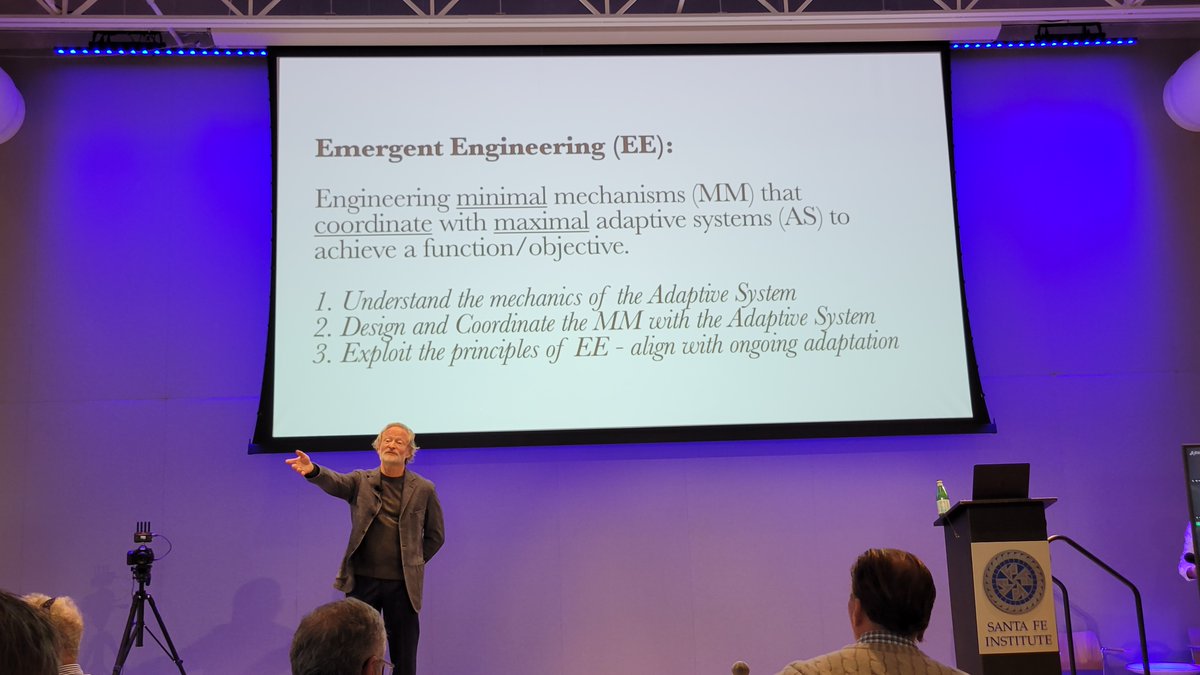
SFI President David Krakauer on the thermocline between classical #physics & #ComplexityEconomics:
"When @VitalikButerin came to SFI, the first FIVE minutes of his talk was about #blockchain: coding. Simple. The REST of the talk was #GameTheory: preventing collusion. Strategic."
"When @VitalikButerin came to SFI, the first FIVE minutes of his talk was about #blockchain: coding. Simple. The REST of the talk was #GameTheory: preventing collusion. Strategic."
"One thing I love: the way we do these November meetings is that they're kind of the 'jazz' of #ComplexSystems."
Next up: SFI External Professor @BettencourtLuis (@miurbanchicago) on the balance between #TopDown & #BottomUp forces in #Cities


Next up: SFI External Professor @BettencourtLuis (@miurbanchicago) on the balance between #TopDown & #BottomUp forces in #Cities
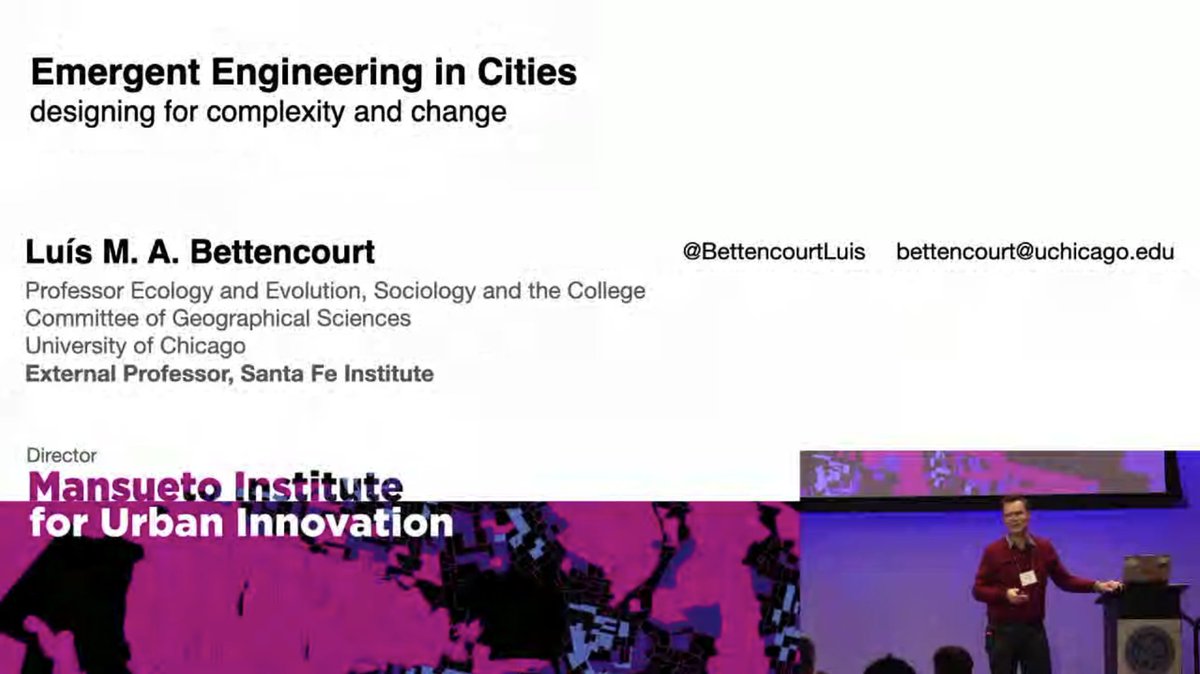

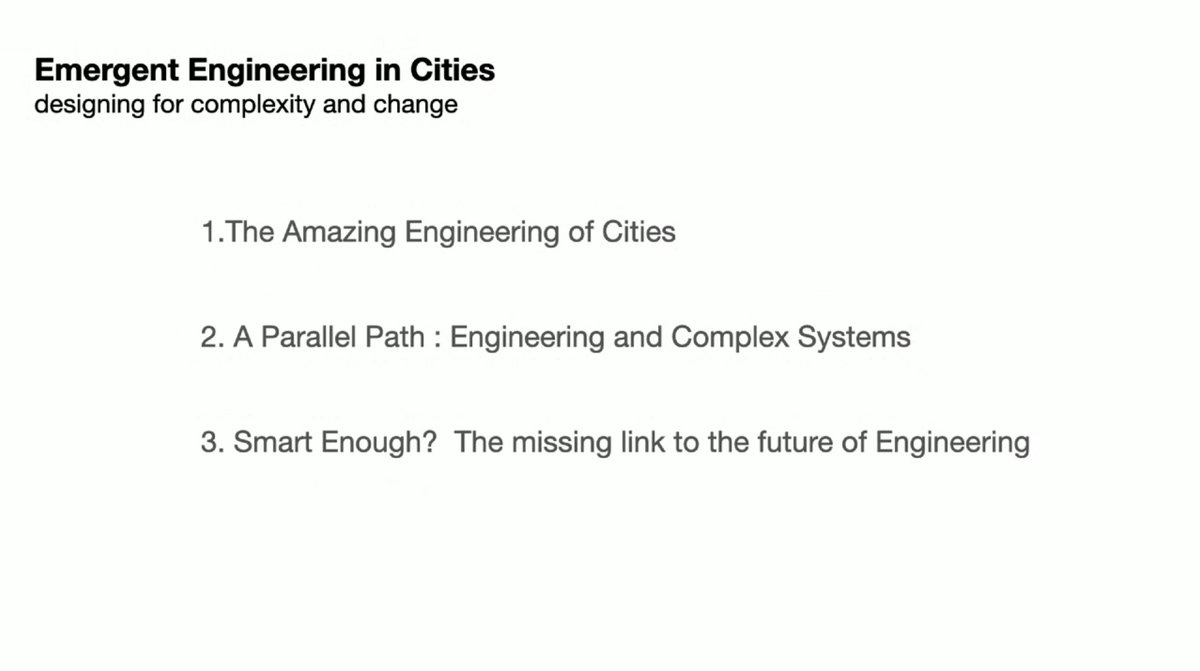
"Look at this picture. It's kind of a miracle. Almost everything you can see in this picture is #engineering. But engineering isn't everything."
@BettencourtLuis on #cities as #serendipity engines for experiences that change your life:
"THAT's what a #city IS."
@BettencourtLuis on #cities as #serendipity engines for experiences that change your life:
"THAT's what a #city IS."

"We know how much road we need. We know when they need to go into the third dimension. We know how many houses we need and how much they will have to cost if we make them all single-family, and why that's a bad idea for affordability."
- @BettencourtLuis on #UrbanScaling

- @BettencourtLuis on #UrbanScaling


"I WISH #SmartCities would be built, because I love #ScienceFiction. But this [@IBM] thing didn't work, because people didn't want to LIVE there."
"In @cityoftoronto, last few years, you could almost do no wrong. But @Google's #SmartCity initiative there went TERRIBLY wrong."

"In @cityoftoronto, last few years, you could almost do no wrong. But @Google's #SmartCity initiative there went TERRIBLY wrong."


"The flyball governor gave us the modern industrial world. It also gave us thermodynamics and statistical mechanics. Later, it led to #cybernetics: the idea was that you could take that governor and with computation, you could do MAGIC on bio & social #systems."
@BettencourtLuis


@BettencourtLuis



"When people started building #robots they wanted them to take perfect, precise steps. But they learned they need to have them interact with the environment."
@BettencourtLuis on the #emergence of #noise as a design principle in advanced mechanical systems.
#AutonomousVehicles
@BettencourtLuis on the #emergence of #noise as a design principle in advanced mechanical systems.
#AutonomousVehicles
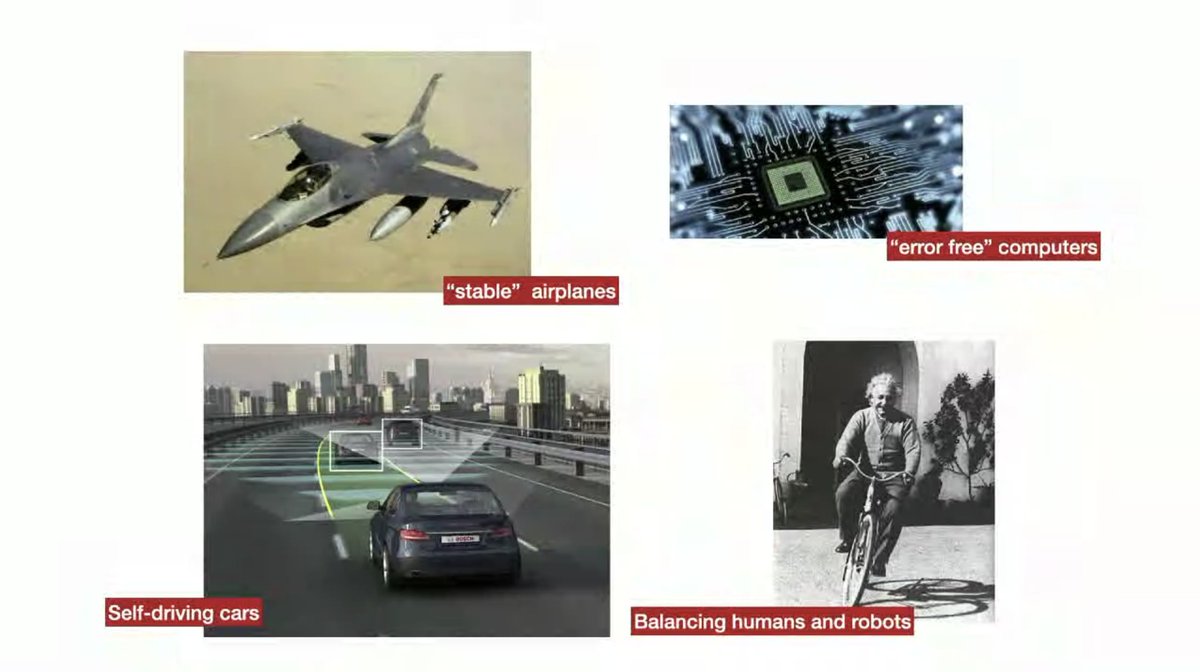
On trad. #feedback:
"You have to know if you have an objective & how far you are from [it]. You [need] a control. And you have to act faster than the environment changes. The lesson here is that for CERTAIN problems, you don't have to be #smart. You don't have to have a theory."

"You have to know if you have an objective & how far you are from [it]. You [need] a control. And you have to act faster than the environment changes. The lesson here is that for CERTAIN problems, you don't have to be #smart. You don't have to have a theory."


On which problems can be solved with #cybernetics thinking (circular feedback) and which can't:
"Some countries controlled the pandemic well and some didn't. Why? Because they didn't act at the right timescale."
"Is the objective that kids TEST well?"
- @BettencourtLuis
"Some countries controlled the pandemic well and some didn't. Why? Because they didn't act at the right timescale."
"Is the objective that kids TEST well?"
- @BettencourtLuis

"All problems in development, as a rule, work on the decade timescale: ten, thirty years."
"In the long term, ALL problems are about #ComplexSystems."
@BettencourtLuis on the conventional #Engineering approach vs. the #EmergentEngineering approach.
"In the long term, ALL problems are about #ComplexSystems."
@BettencourtLuis on the conventional #Engineering approach vs. the #EmergentEngineering approach.

"The motivation for what people were doing after WWII came from science. But what as you go [forward], what happened to #cybernetics is the science went away. This became very important as a way of seeing, but it didn't do what we were asking."
@BettencourtLuis
(cc @stewartbrand)
@BettencourtLuis
(cc @stewartbrand)

"Your body is full of #automation, but if you want to evolve, to grow, it's deadly."
"The automation of #SmartCities destroys the #heterogeneity, the #innovation of the city. I don't mean to pick on @sidewalklabs, but you guys should have known better."
@BettencourtLuis



"The automation of #SmartCities destroys the #heterogeneity, the #innovation of the city. I don't mean to pick on @sidewalklabs, but you guys should have known better."
@BettencourtLuis

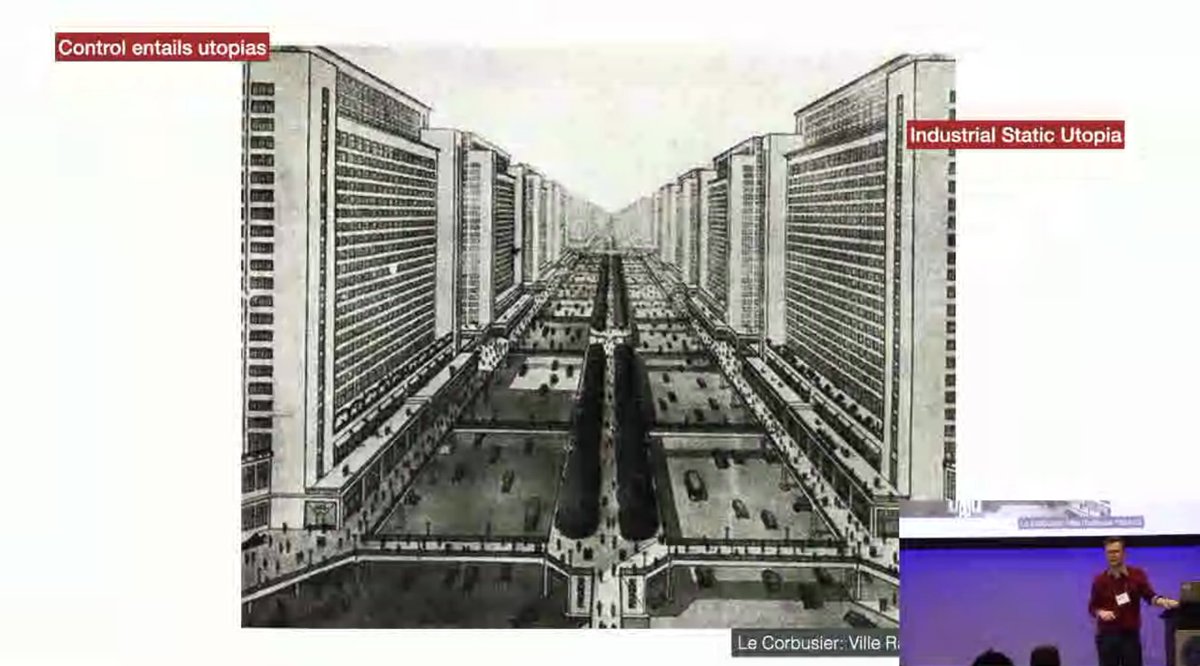
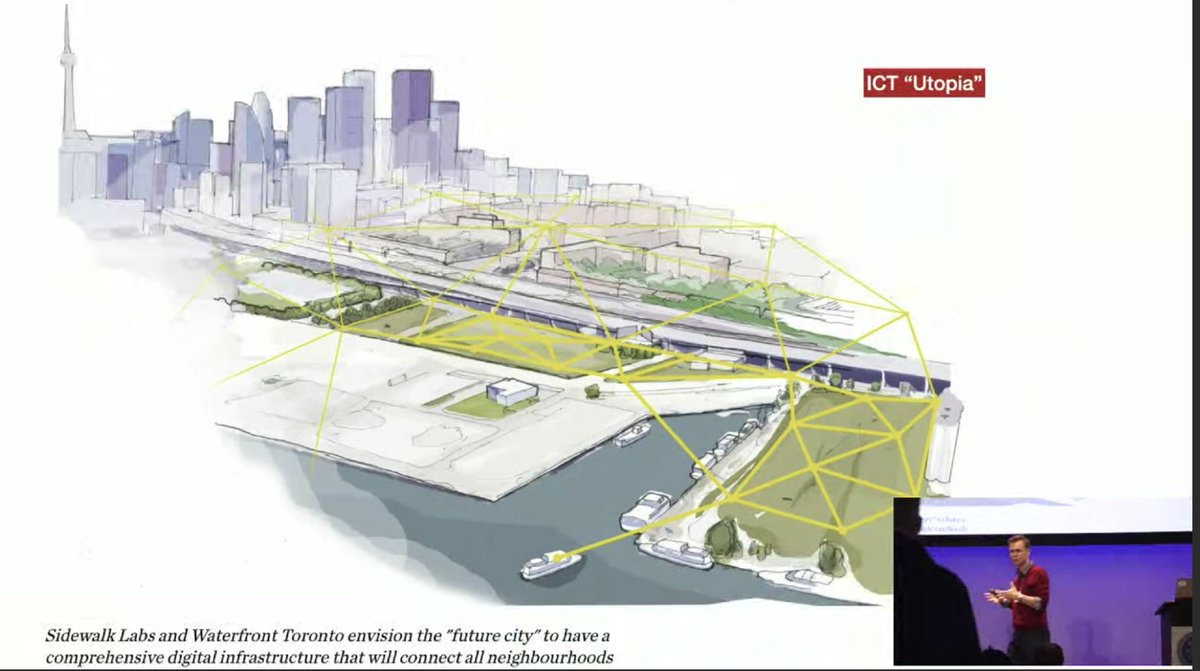

"This is one of the successes of #SmartCities: people understood that bus systems are a mess, and that they needed to be a controllable system with dedicated lanes, platforms. They became much more like a subway system. It's much cheaper: more controllable for a simple function." 

"This is what all of the engineering of a city is trying to do: to give niches to people, incentives for them to interact, to move around."
"Evolution does its selection through death. So in many human systems evolution becomes learning. People have to be able to make mistakes."
"Evolution does its selection through death. So in many human systems evolution becomes learning. People have to be able to make mistakes."

"The city is not telling people what to do. #Cities and ecosystems are a special type of complex system. They afford a lot of turnover. We don't have objective functions, controlling levers. Problems of [#sustainability] are problems of large scale, complicated redistribution..." 

Next up: @knowledgeprob on the modernization of the #ElectricalGrid — digitization, #ElectricVehicles, plummeting costs of #CleanEnergy technology — and how this generated unintended consequences where #EmergentEngineering could help improve coordination. 







"We have been thinking about our work as trying to design self-organization in [#TheGrid]."
The distribution system is becoming a cyber-physical-social system, being managed & controlled top-down as a physical system. [But] Humans are called [still] 'load.' They're not central."
The distribution system is becoming a cyber-physical-social system, being managed & controlled top-down as a physical system. [But] Humans are called [still] 'load.' They're not central."
"I've been foregrounding the #epistemology & the idea that energy markets are #decentralized complex adaptive #systems. We've settled on this idea that market price IS the control signal."
- @knowledgeprob on #TransactiveEnergy, using markets to coordinate heterogeneous resources
- @knowledgeprob on #TransactiveEnergy, using markets to coordinate heterogeneous resources

"From an #economics perspective, digital #technology's primary role in our lives is as a reducer of transaction costs. Standard neoclassical economics is not the whole story, but it's still an important part of the theoretical toolkit. Price is informative."
- @knowledgeprob
- @knowledgeprob

"Your #thermostat can participate in a #decentralized digital energy market. Here, #automation is beneficial because it reduces transaction costs."
- @knowledgeprob on her field experiment with @DavidChassin to scale the #OlympicPeninsula grid:
- @knowledgeprob on her field experiment with @DavidChassin to scale the #OlympicPeninsula grid:

"The vertical part is the 'unresponsive load' that is not digitally connected and cannot respond to this price signal. The middle part is bidding into that energy market in real-time. We organized this [residential market] as a double auction...they LOVED it."
- @knowledgeprob
- @knowledgeprob

"Fast-forward from 2006 when it was all about thermostats and water heaters...the impetus [has grown] to find ways to coordinate an electric distribution system. We have rooftop solar, batteries, electric vehicles..."
- @knowledgeprob
- @knowledgeprob

"Once you've got a charge in that #battery, it's a supply-side resource. The owner can change whether it's a buyer or a seller...if they think they can make money by selling into the #EnergyMarket, sure: 'Sell when the price is high enough.'"
- @knowledgeprob
- @knowledgeprob

"The target here is working with low-income folks in impoverished rural communities. I have to, as the mechanism design person, figure out how the batteries bid in, does the battery have market power, all that fun stuff."
- @knowledgeprob


- @knowledgeprob



"We have data from the Olympic Peninsula project showing some scale-free behavior and some self-organization. We keep looking into stability issues, especially in the edge cases, but we're very excited about this."
- @knowledgeprob
- @knowledgeprob

"This is an epistemically humble system."
- @knowledgeprob
- @knowledgeprob
Next up, @emiyazono (@protocollabs) on @sourcecred, @filecoin, & using #cryptocurrency #networks to experiment on emergent economic systems—starting w/ a simple but robust model of how #Bitcoin works: "A lottery where people are willing to waste energy to accomplish their goals." 





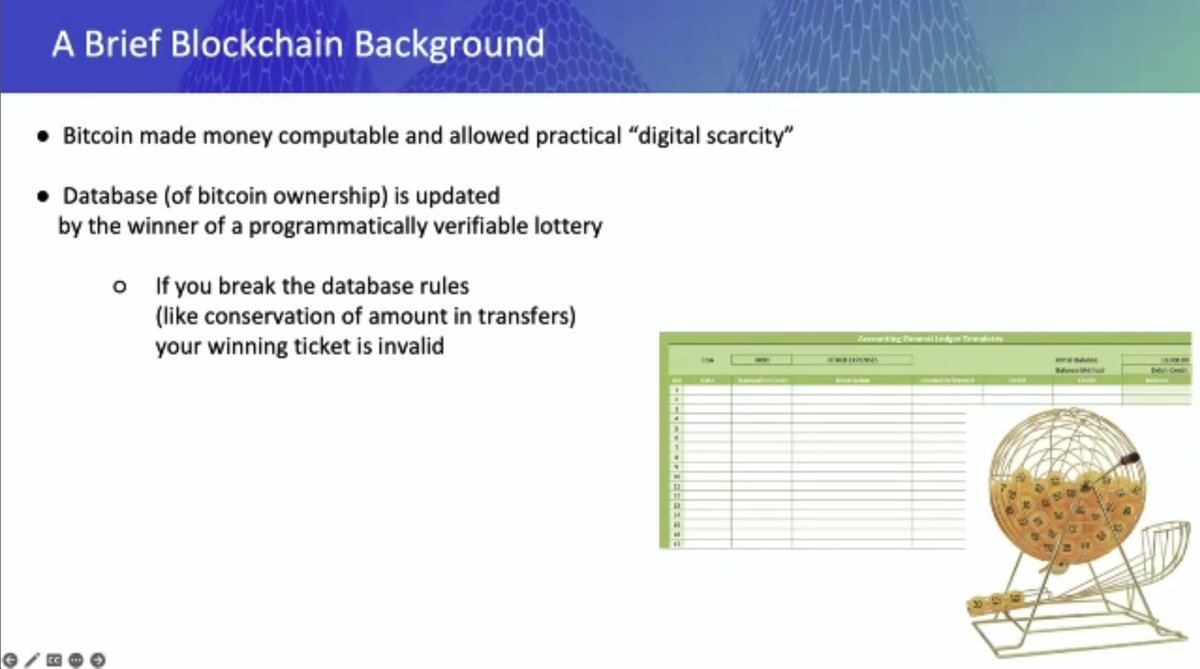

"Given that @protocollabs is trying to #SaveTheInternet, you might think we'd want to reduce oligopolistic pricing #power and prevent things like how @airbnb set the pricing of the #RealEstate market."
- @emiyazono on the raison d'être of @Filecoin:


- @emiyazono on the raison d'être of @Filecoin:



"While you CAN computationally verify that someone is storing a file, you CAN'T computationally verify whether that file is USEFUL. To differentiate between REAL data and zeroes, or encrypted zeroes, we created an additional layer called @filecoin #Trust."
- @emiyazono

- @emiyazono


"This is roughly 4% of information stored on @awscloud based on 2021 numbers. We don't run ANY of these servers. This is an entirely emergent economy that has been formed around file storage based on this promise of what decentralized storage can be."
- @emiyazono on @Filecoin

- @emiyazono on @Filecoin

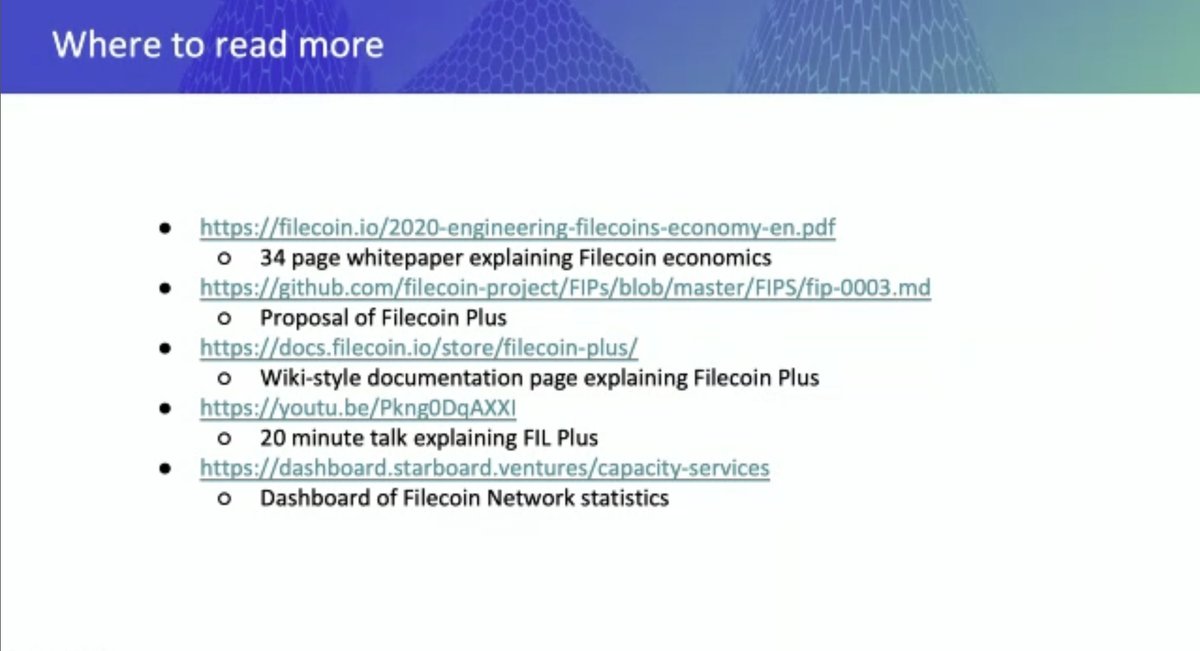
On @sourcecred, a #blockchain-based reputation management system to replace centralized systems like the @Google #PageRank algorithm:
"The project, from a very early state, was able to run on this permissionless employment model."
- @emiyazono



"The project, from a very early state, was able to run on this permissionless employment model."
- @emiyazono




@sourcecred @Google @emiyazono On using #Web3 + @hypercerts to engineer markets for positive externalities:
"Our hypothesis is that you can benefit from all the de-risking of hindsight funding, but all of the impact of prospective funding."
- @emiyazono (@protocollabs)
#DeFi #DeSci

"Our hypothesis is that you can benefit from all the de-risking of hindsight funding, but all of the impact of prospective funding."
- @emiyazono (@protocollabs)
#DeFi #DeSci


"We don't know if #Web3 is going to adapt in ways that we prefer or whether it will adapt in ways we find catastrophic. What I'm going to present is the PROBLEM, without any discussion of the SOLUTION, because I don't have it..."
- David Wolpert on #SmartContracts & #GameTheory
- David Wolpert on #SmartContracts & #GameTheory

"There are features of #Web3 that we are verifying through empirical experiments...these phenomena will be rife and have all kinds of #UnintendedConsequences, and I don't know how to get ahead of that curve."
"#SmartContracts are binding. They're almost a new law of physics."
"#SmartContracts are binding. They're almost a new law of physics."

On #NashEquilibria, public ledgers, and the pending economic singularity David Wolpert sees as effectively inevitable:
"When there's real money on the table, what will happen is the row player goes bottom and the column player goes right. But then a third player comes in..."
"When there's real money on the table, what will happen is the row player goes bottom and the column player goes right. But then a third player comes in..."

"There's no reason to believe that [#extortion by third parties], or imperative #arbitrage, won't be RIFE. Their threat is, 'I will give you 2 #Bitcoin if you play "top" — otherwise I give you 0.' This all happens before they choose their moves. The game they're playing changes." 
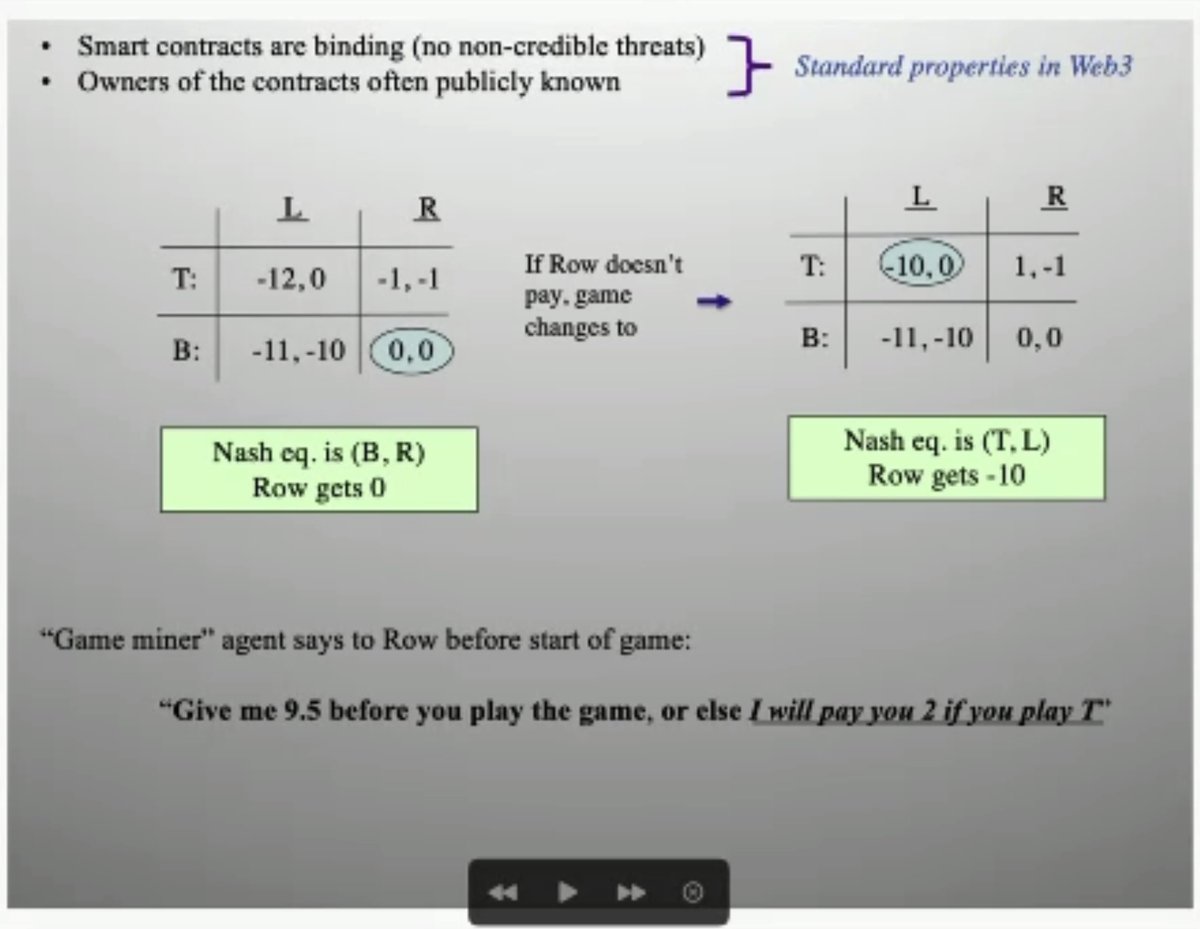
"This moves the #NashEquilibrium from the bottom right to the top left. The row player — and we have experiments with real humans confirming this — will choose to pay before the start of the game. Legal extortion. This will be all over the place, done by bots working for humans." 

"Then there's going to be a fourth party...[etc.]. The whole thing exfoliates into a #Turing complete structure, meaning we can't even write equations to determine what happens."
- David Wolpert on the economic #Singularity caused by #SmartContracts and bidding bot arms races...
- David Wolpert on the economic #Singularity caused by #SmartContracts and bidding bot arms races...

"I really like this idea of building #decentralized applications [like @IPFS]. You'd think that with all of these different parties with similar interests—even if it's all #value extraction—there would be things like #resilience, [positive sum], etc."
- SFI Fellow Maell Cullen
- SFI Fellow Maell Cullen

"The @terra_money crash was a failure in algorithmic #stablecoin design...but MANY people KNEW it was going to fail, and it was only a matter of WHEN."
- SFI Fellow Maell Cullen
- SFI Fellow Maell Cullen
"As a community, as a whole, there was a failure in communication somewhere — whether it was willful ignorance, greed, or just short memories — these emergent properties to protect investors simply weren't there."
- SFI Fellow Maell Cullen
- SFI Fellow Maell Cullen
"We have to wonder what a catastrophic failure of governance would look like [in #Web3]. If you tokenize your ability to govern, it's subject to all the usual attack vectors. Are there even more insidious failures of decentralized government?"
- SFI Fellow Maell Cullen
- SFI Fellow Maell Cullen
"If the problem is BIG enough, turns out the smart contracts AREN'T actually binding."
- @emiyazono responds optimistically to David Wolpert's concerns about a #GameTheory x #SmartContracts runaway economic singularity
- @emiyazono responds optimistically to David Wolpert's concerns about a #GameTheory x #SmartContracts runaway economic singularity

"I'm fairly sure that 'Code is law,' which gets repeated a lot in the #blockchain space, was originally stated by @lessig and meant in context, 'Code as policy,' not PHYSICAL law."
- @emiyazono (@protocollabs)
- @emiyazono (@protocollabs)
🚀 And we're back for day two of our annual #AppliedComplexity Network and Board of Trustees Symposium on #EmergentEngineering — starting w/ a discussion between Geoffrey West & @mlaubic on the #Anthropocene:
(Videos will be available to members of santafe.edu/action)
(Videos will be available to members of santafe.edu/action)

"The #Anthropocene is an age riddled with problems of our own making, and the way OUT of them is #EmergentEngineering. This is the weekend of #COP27, and if you want to describe COP, it's the wrong engineering ideal with the wrong model of governance."
- @mlaubic (SFI, @ASU)
- @mlaubic (SFI, @ASU)

"By anybody's account we have left what we can consider 'a safe operating speak.' We are at 'the edge of #chaos,' so to speak, because interesting things can happen, but also very disastrous things...systemic risks for which there isn't an insurance market."
- @mlaubic (SFI+@ASU)
- @mlaubic (SFI+@ASU)

"3.8 billion years of evolution, most of it boring...but SOME of it interesting. #MajorEvolutionaryTransitions cannot be explained with standard theories and models because they involve changes to the way matter, energy, and knowledge and information flow through those systems." 

"We need to understand how complex regulatory networks interact with the niches that those networks construct for themselves. And we need to understand history better, because evolutionary theory has a concept of time, but not a concept of history."
- @mlaubic (SFI+@ASU)
- @mlaubic (SFI+@ASU)

"In #EES Extended Evolutionary Theory, systems externalize traits into extended phenotypes, which act as a new environment for selection...but the more interesting part is INTERNALIZATION, how constructed niches alter pathways within the regulatory networks." 



"If you think about #cities as systems that construct their niches, that have effects on their own functioning and on their hinterlands, so to speak, then we're talking about...the constant transformation of the city through those feedback mechanisms."
- @mlaubic #Anthropocene
- @mlaubic #Anthropocene
"We have the #Technosphere interacting with all the other known spheres. That by itself wouldn't be problematic, but if you look at the temporal scales of the technosphere, it goes to the nanosecond scale [but] all of the others have overlapping coevolutionary feedback cycles." 

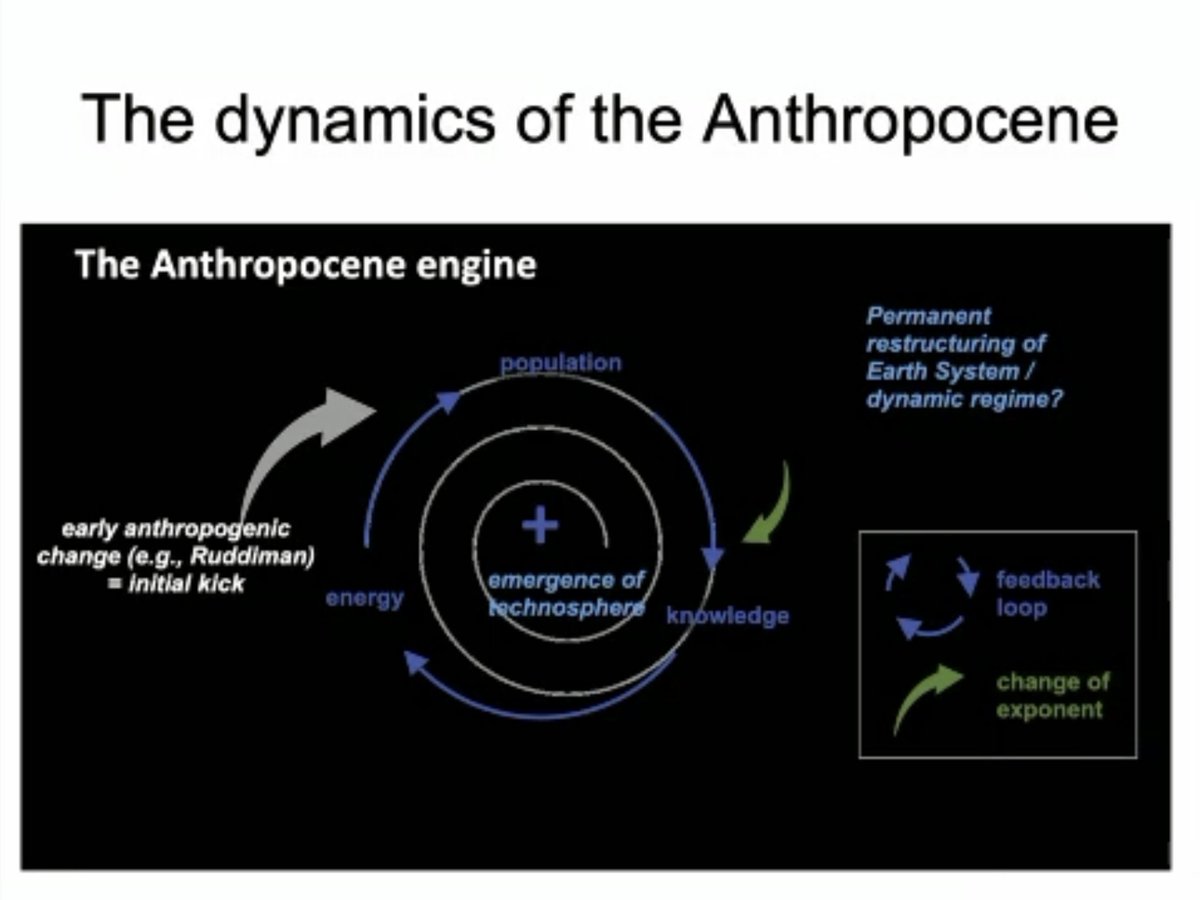
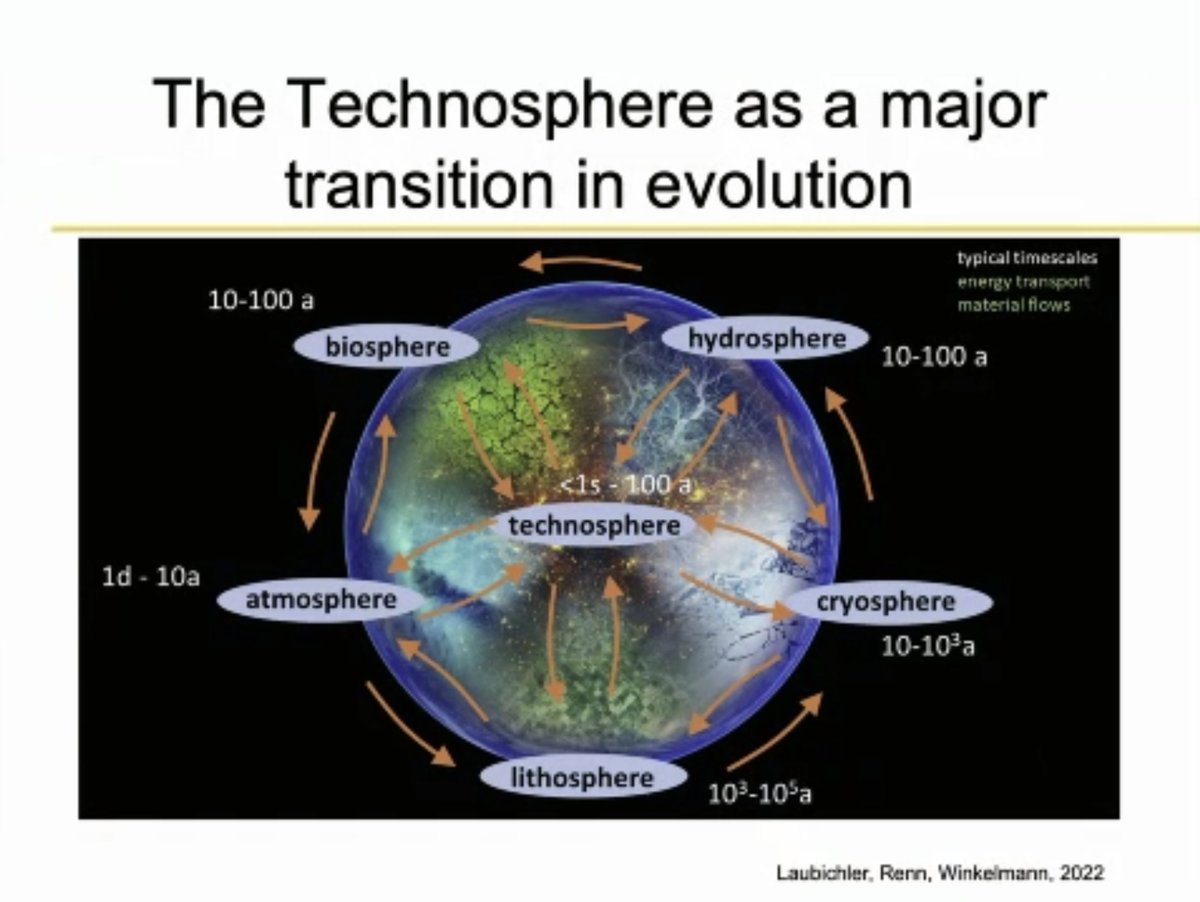
"With the elimination of negative feedback mechanisms, the #acceleration [of runaway positive feedback mechanisms in human societies] can be measured quantitatively."
- @mlaubic

- @mlaubic


SFI Prof Geoffrey West begins by quoting John von Neumann ("a kind of one-man Santa Fe Institute")'s 1953 comment on the technological #singularity — & asks what #PhaseTransitions & #TippingPoints mean for the #Anthropocene.
J-curves abound: "Population has gone straight up."



J-curves abound: "Population has gone straight up."
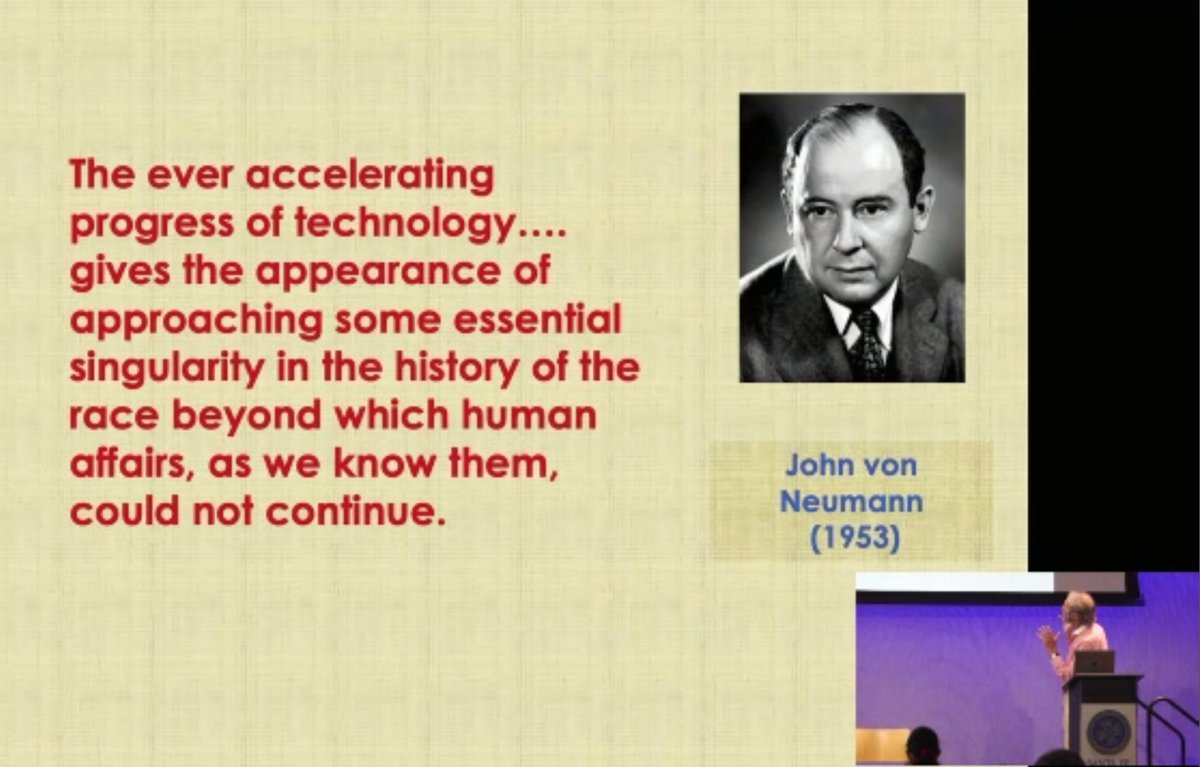



"It's not just that we live in an exponentially expanding physical universe. We live in a super-exponentially expanding ECONOMIC universe."
"You see the night lights of cities [in these slides], but what those lights REALLY are is the burning of the surface of the planet."



"You see the night lights of cities [in these slides], but what those lights REALLY are is the burning of the surface of the planet."




Geoffrey West on #cities as reactors for the improvement of quality of life:
"The idea of course, is not only to do this, but to do it for EVERYBODY. But this comes AT A PRICE, because of the second law of #thermodynamics. You inevitably create social and physical #entropy."

"The idea of course, is not only to do this, but to do it for EVERYBODY. But this comes AT A PRICE, because of the second law of #thermodynamics. You inevitably create social and physical #entropy."


"#Biology is of course REPLETE w/ #networks. The properties of these networks constrain life. Kleiber's Law looks like #engineering — it's actually #ADAPTIVE engineering constrained by the properties of these networks. There's an #economy of #scale, bounded growth."
#ScalingLaws



#ScalingLaws


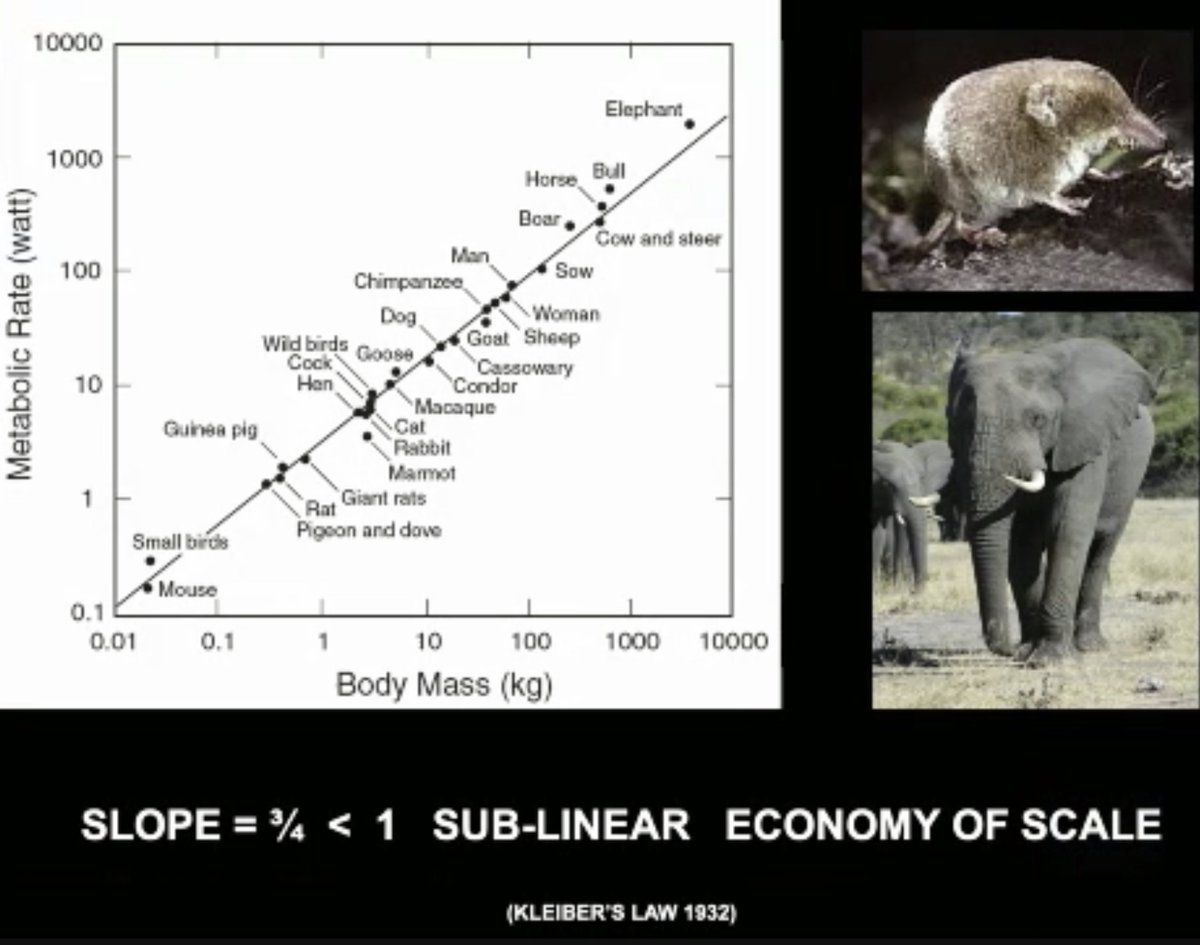
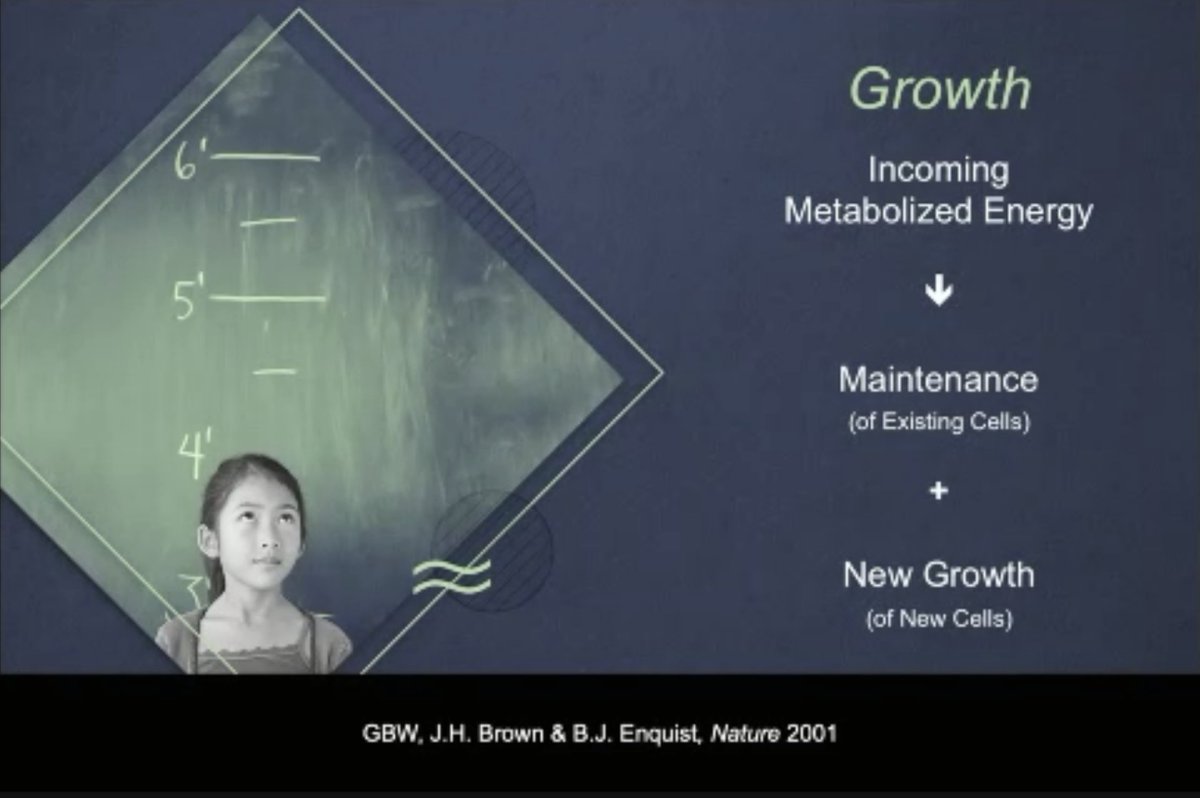
"Infrastructure looks like biology. There's a different slope. But the interesting thing about cities is the social networks. The nodes have to be not just in a place but actually MOVING. The city is the combination of these. As far as we know it's happened once in the universe." 







"Just sitting there, you consume about 100 watts — an incandescent light bulb requires 2000 calories a day. But we have to move...I think there are still people on this planet, hunter-gatherers, who use about 300 watts. And that was ALL of us until #TheAnthropocene." 
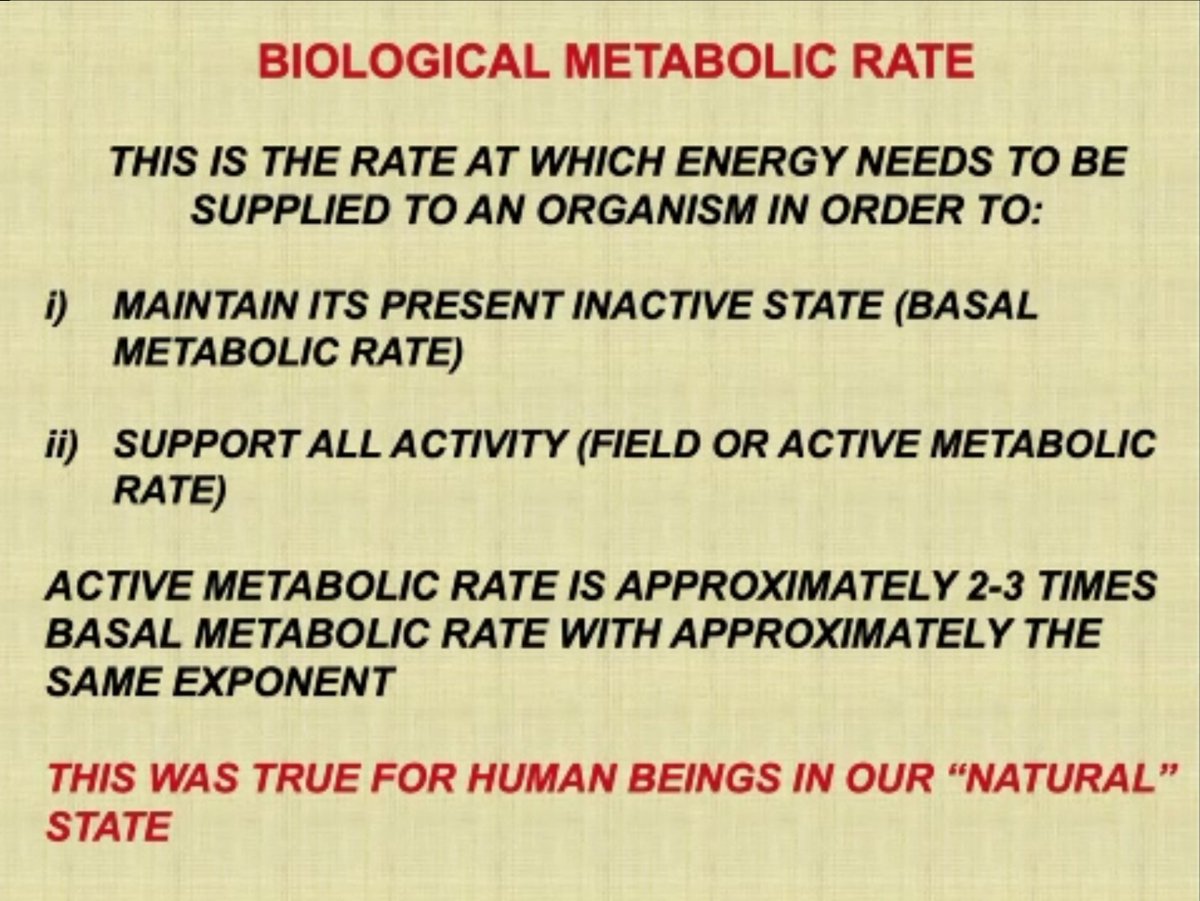
"Now, in #TheAnthropocene, we have the SOCIAL metabolic rate — the sum of the energy needed to maintain the system as it is, and then add to that the energy of everybody moving around, or doing their taxes, or having a great idea. Metabolic rate now is about ten THOUSAND watts." 



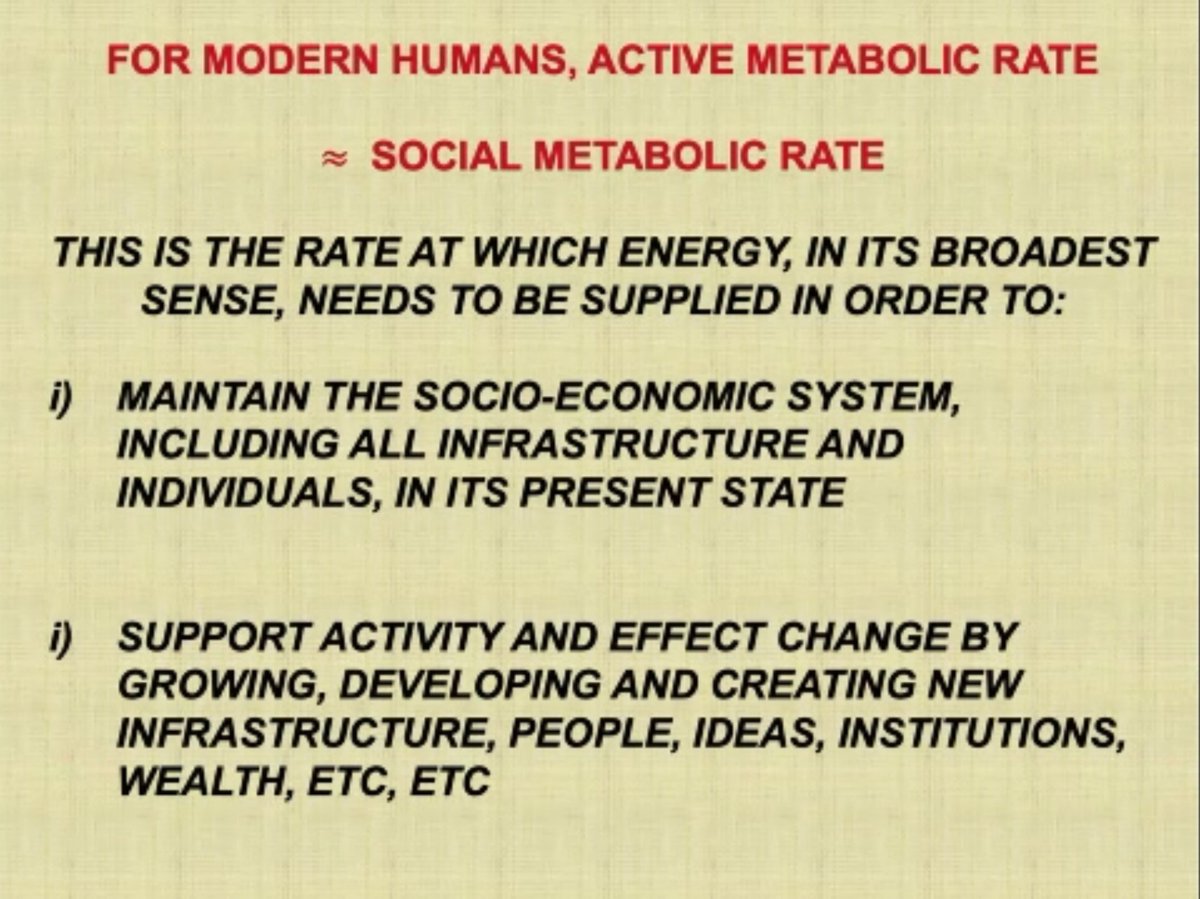



"There are now eight billion people on the planet, and those eight billion people all want to be like you and me and consume enough energy to be twelve elephants. We carry with us a refrigerator and a house and GDP..."
- Geoffrey West characterizes the problem of #TheAnthropocene

- Geoffrey West characterizes the problem of #TheAnthropocene


"Not surprisingly, the character of the solution depends on which term dominates — whether the basal metabolic rate dominates over the social metabolic rate, or not. If the maintenance grows faster than supply, or if the supply grows faster and faster." 



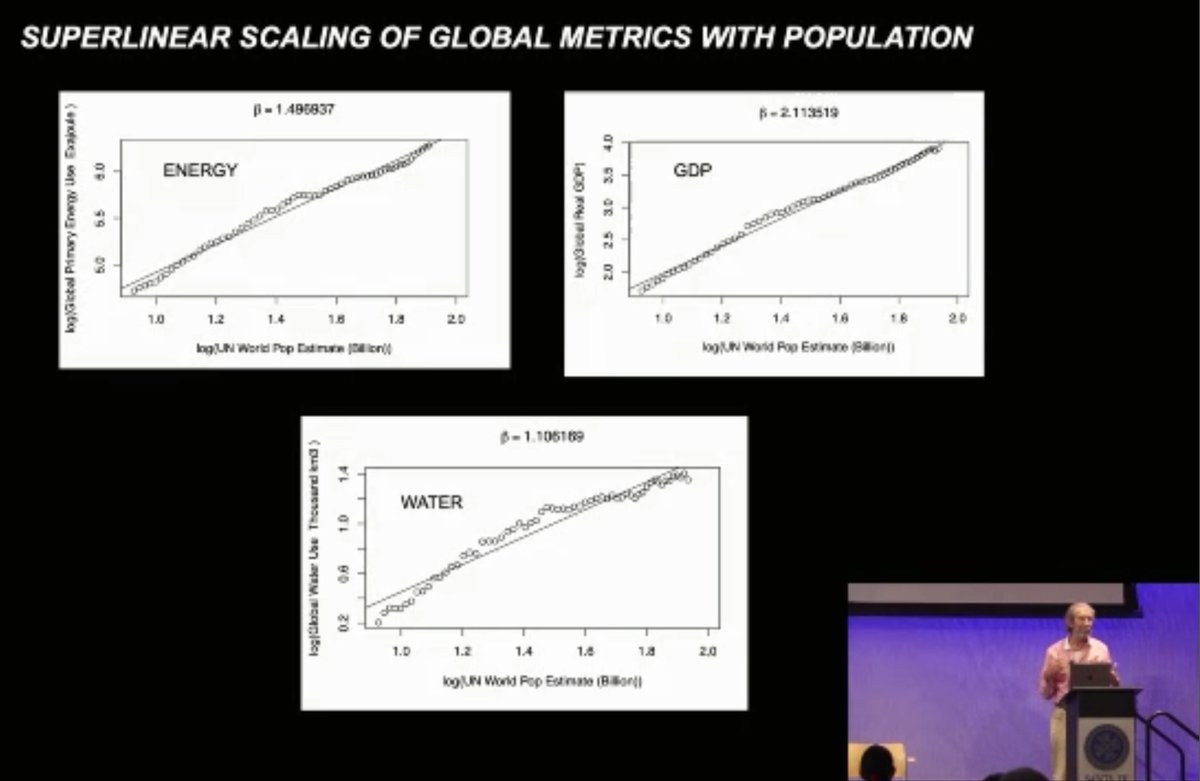


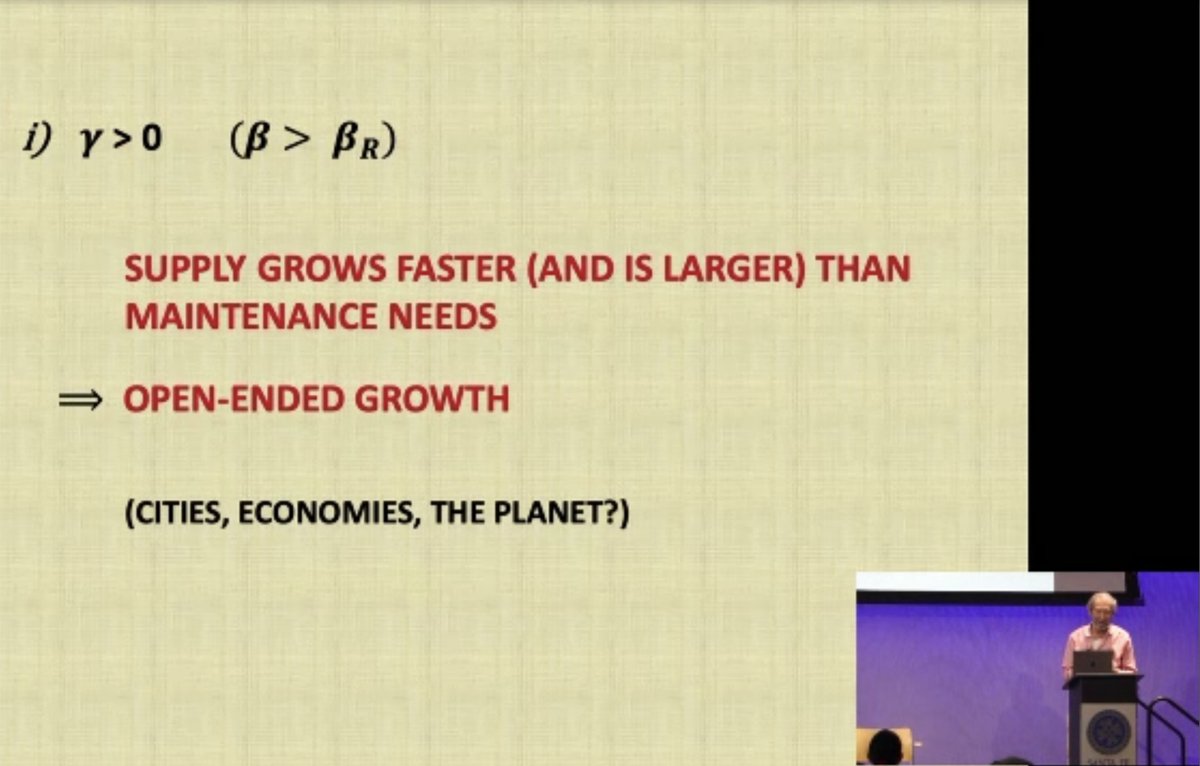
"With every major new discovery, you reset the boundary conditions. For UNBOUNDED growth, you have to keep reinventing yourself and you have to live faster and faster."
- Geoffrey West
#Innovation #Collapse #Singularity


- Geoffrey West
#Innovation #Collapse #Singularity



"Something happened in the 1970s...we avoided some kind of singularity. We've speculated about that: something to do with organization, or with the oil crisis? Something dramatically changed. But we're leading up to a NEW singularity." 

"#Innovation does not solve a problem. It POSTPONES THE problem."
"You and I are the same as we were BEFORE the #Anthropocene. We have the same brain and the same body. The question is, can we adapt? Soon, there will come a time when NO ONE can."
- Geoffrey West


"You and I are the same as we were BEFORE the #Anthropocene. We have the same brain and the same body. The question is, can we adapt? Soon, there will come a time when NO ONE can."
- Geoffrey West


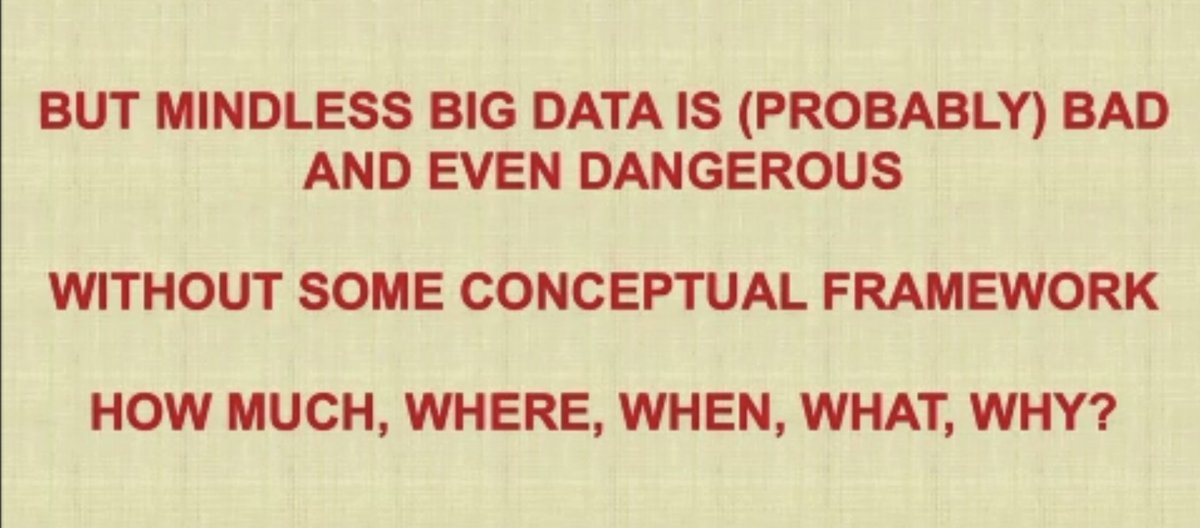
"One of the problems here is that the predictions are pretty sensitive to the data inputs..."
- Geoffrey West
- Geoffrey West
"Where are the intervention points for #EmergentEngineering? There are plenty of them, but some of them are more important than others."
- @mlaubic
- @mlaubic

Responding to @dawallach on declining birth rates:
"In parts of the world [most] energy is going into growth. In others it's going into maintenance. Even if we STOP growing by number of people the energy needed to sustain the #technosphere is still a VERY large number."
@mlaubic
"In parts of the world [most] energy is going into growth. In others it's going into maintenance. Even if we STOP growing by number of people the energy needed to sustain the #technosphere is still a VERY large number."
@mlaubic
"There IS a record for how fast human beings can run. I don't care how many records are being broken. There must be #limits to the speed of neuronal activity. There are limits to the speed at which we can adapt [to unintended consequences of #innovation."
- SFI Prof Geoffrey West
- SFI Prof Geoffrey West
Next up, @JessicaLeeGreen (@phylagen):
"I'm going to share my journey as a microbial scientist, some of the problems we're facing today, and the promise of #EmergentEngineering...which [in agreement with @mlaubic, I see as] meaningful, sustainable, and just."
"I'm going to share my journey as a microbial scientist, some of the problems we're facing today, and the promise of #EmergentEngineering...which [in agreement with @mlaubic, I see as] meaningful, sustainable, and just."

"As an engineer, I was taught that micro-organisms are particles, and we were taught to understand them with the mechanics of mass and transport...which makes sense, because it's hard to visually distinguish between them. And then #genomics happened..."
- @JessicaLeeGreen



- @JessicaLeeGreen




"We live in this SEA of microbial activity, and we spend 90% of our lives indoors. And yet we know very little about microbial life in the world."
"When I look out at all of you, I see your microbial clouds...the decisions we make about [architecture] effect [your #microbiome]."


"When I look out at all of you, I see your microbial clouds...the decisions we make about [architecture] effect [your #microbiome]."



"We studied the hospital environment [b/c] the way air is treated in hospitals is very intensive. Facilities managers wanted to understand tradeoffs btw energy use & air quality. We simulated natural circulation in mechanically ventilated rooms as if you could open the window." 

"In hospital air, we saw lots of the same types of organisms, but in outdoor air we saw a greater diversity of microbes. Hospital air had the highest levels of microbes that were found in the human mouth, hair, and skin...outdoor air had the highest levels of outdoor microbes." 



On the use of a "night flush" to change the composition of indoor microbial communities in sealed buildings, @JessicaLeeGreen:
"Night flush classrooms pick up what's going on in the outdoor air environment."
Otherwise, indoors are dominated by microbes that live on human bodies.


"Night flush classrooms pick up what's going on in the outdoor air environment."
Otherwise, indoors are dominated by microbes that live on human bodies.

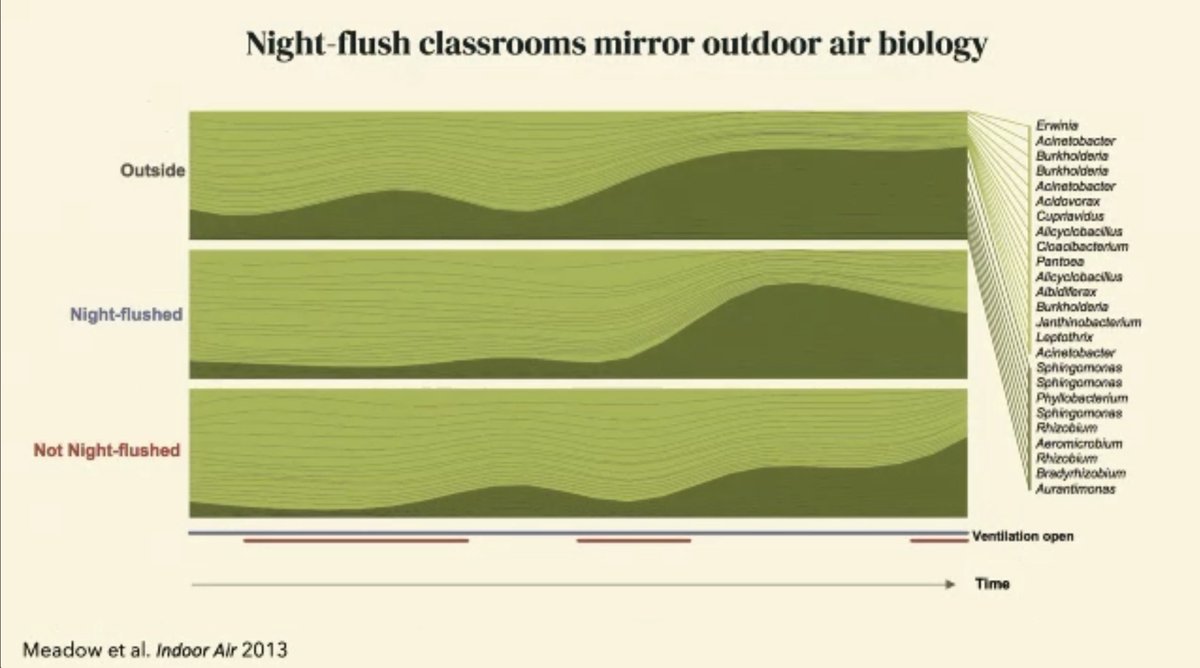
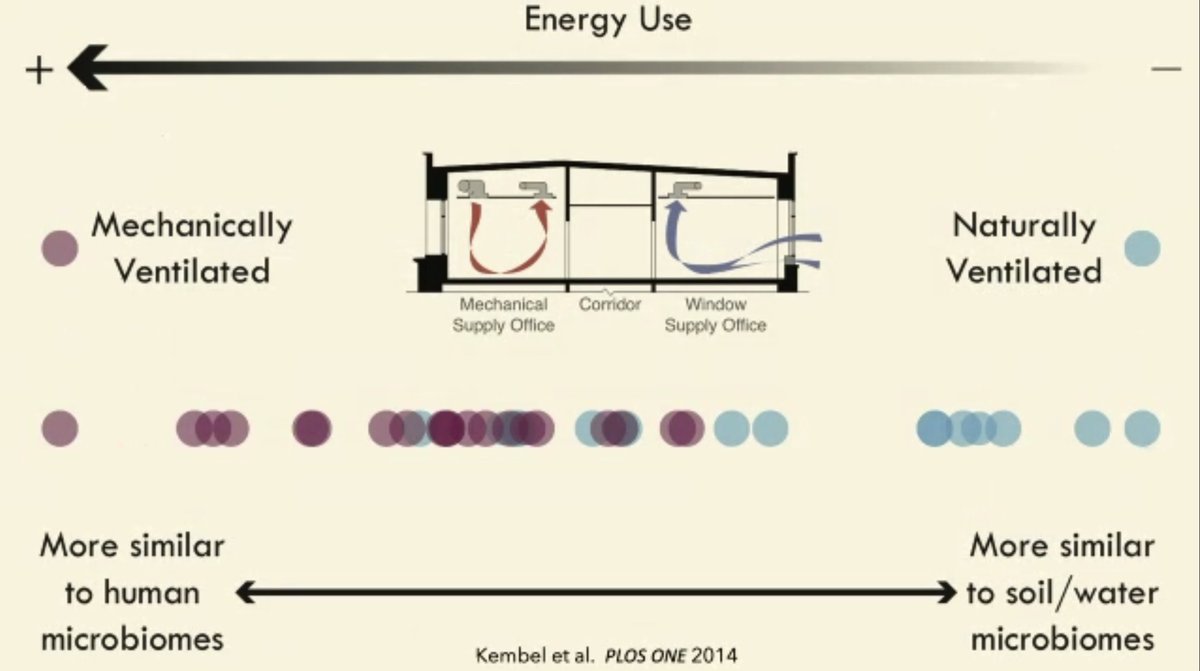
"When #COVID happened, at @Phylagen I knew we were not going to be ready to do direct air sampling so we developed a mode of testing for indoor air microbes using settled aerosols. We trained 1000s of people to use swabs on office surfaces & then tested w/ qPCR."
@JessicaLeeGreen


@JessicaLeeGreen



"We had a contract with the entire @_WTCOfficial complex and swabbed every surface in those buildings every day for over a year. I believe that we did help suppress some spread of #COVID during the work we conducted."
- @JessicaLeeGreen of @phylagen


- @JessicaLeeGreen of @phylagen



"If you're a facilities manager today, your #1 job is to meet sustainability goals put forth by your organization. And there's a real tradeoff between keeping air healthy & meeting energy use needs. This is a conundrum I want to meet w/ #EmergentEngineering."
#AirQuality #NetZero


#AirQuality #NetZero



"The more prevalent climate change becomes, the more prevalent indoor disease is going to become. NOW is the time to begin to invest in sustainable clean air. We really need to be monitoring for airborne biologics."
- @JessicaLeeGreen (@Phylagen)
- @JessicaLeeGreen (@Phylagen)

"We've designed an air filter that picks up aerosols & runs qPCRs directly on that filter. It's totally automated so you just plug it in & walk away. It'll perform 100 tests without you touching it. It's quieter than a fridge. You can send used filters in for further sequencing." 



"I can tell you, there's not a great incentive for an airline to be tracking airborne biologics. Indoor air quality is not regulated. That's a major challenge."
"Our buildings are not designed today to reliably monitor indoor air quality."
- @JessicaLeeGreen (@phylagen)
"Our buildings are not designed today to reliably monitor indoor air quality."
- @JessicaLeeGreen (@phylagen)
Next up, a panel moderated by Travis Holmes, Director of our Emergent Political Economies program, with panelists @knowledgeprob, @BettencourtLuis, SFI Prof Cris Moore, and SFI VP Will Tracy.
Where does #EmergentEngineering intersect with human society & politics?
Where does #EmergentEngineering intersect with human society & politics?

"One of the characteristics of the energy economy is that both regulators and regulated are very risk-averse. So one fundamental question is, how do we reduce barriers to innovation while keeping electricity safe, reliable, affordable, resilient, and low-carbon?"
—@knowledgeprob
—@knowledgeprob

"I think invisibility depends on point of view: some people won't see the individual, the social processes. They want to see the city as a machine. But there's also the reverse kind of invisibility: oftentimes we don't see the engineering."
- @BettencourtLuis
- @BettencourtLuis

"If you think about what a social system is, not as a machine but as an emergent [phenomenon], it needs the #agency and #cooperation of A LOT of people. For them to work well, it requires that agents are respected and fully appreciated."
- @BettencourtLuis on #inclusion & #cities
- @BettencourtLuis on #inclusion & #cities
"Neoclassical econ is institutionally sterile. One assumption we make to make the math work is that everyone is acting on complete information..."
"I want to put up Elinor Ostrom, who helped people analyze how norms & rules interact to create food deserts."
- @Knowledgeprob
"I want to put up Elinor Ostrom, who helped people analyze how norms & rules interact to create food deserts."
- @Knowledgeprob
@knowledgeprob "When I came to SFI in 1992, it seemed to everybody that #decentralism was historically inevitable: that authoritarians would be swept aside, that the Internet would allow people to communicate freely across national boundaries...it doesn't seem that way now."
- Cristopher Moore
- Cristopher Moore

"I'm trying to train myself to be more agnostic about at what scale problems should be addressed..."
- SFI Professor Cristopher Moore
- SFI Professor Cristopher Moore
"Research takes a lot of wind out of the whole '#EchoChamber' argument [but] at a surface level, we see a lot of incidents being correlated with struggles w/ #democracy."
- SFI VP Will Tracy
(See also work by @DG_Rand & how #polarization can actually be useful for #factchecking)
- SFI VP Will Tracy
(See also work by @DG_Rand & how #polarization can actually be useful for #factchecking)
"We have the oldest democratic country in the world kowtowing to this anti-democratic principle. We have @apple kowtowing to it. But @Wikipedia lists #Taiwan as a country. Wikipedia is a social innovation, a culture w/ clearly-stated norms that don't evolve as fast as you think." 

"I see @Twitter as a low-lying equilibrium trap. For all the bad stuff that was going on there, a lot of good people just kept going on with it. Now [with verification badges for sale thanks to @elonmusk] we should be empowering people to find alternatives."
- SFI VP Will Tracy
- SFI VP Will Tracy
@Twitter @elonmusk "One thing that doesn't work is exposing individuals to a lot of crazy influences and then saying, 'Let's count now.' There's no give and take in that process. But [hopefully], I've been reading about citizens' assemblies and deliberative democracy..."
- Cris Moore
- Cris Moore
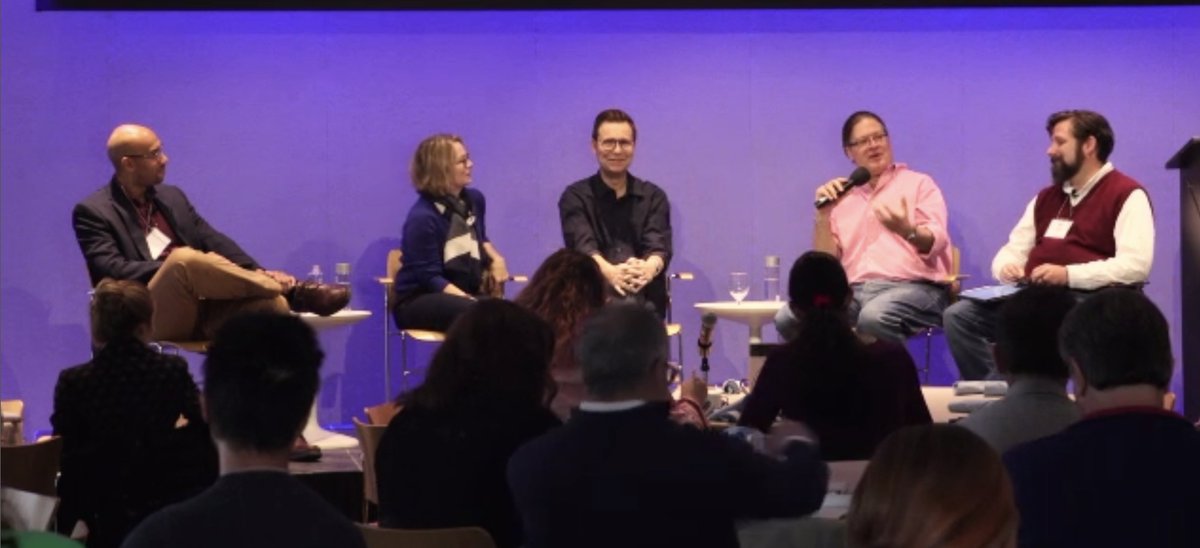
"My grandmother didn't blame @FoxNews for the decline of democracy. She blamed @cspan, because suddenly everything that every representative said was televised."
- Cris Moore
- Cris Moore
"You want enough regulatory certainty that people can make investments with confidence, but you want to make enough room for experimentation...so one thing I'm seeing is the formation of regulatory sandboxes, so [people] can 'kick the tires' on new technologies."
- @knowledgeprob
- @knowledgeprob
@knowledgeprob "If you think having your water company run by the government is socialism, that's CRAZY. You need water! But for [#innovation] you need systems to be decentralized. There's always this dichotomy happening all the time. Complex systems are not perfect systems."
- @BettencourtLuis
- @BettencourtLuis

"Premature #optimization is the root of all evil."
- Donald Knuth, quoted by Cris Moore
"Most of the time we DON'T have a clear objective, and optimizing too quickly is a bad idea."
- Cris Moore
Related: Moore on #AlgorithmicJustice
complexity.simplecast.com/episodes/51
- Donald Knuth, quoted by Cris Moore
"Most of the time we DON'T have a clear objective, and optimizing too quickly is a bad idea."
- Cris Moore
Related: Moore on #AlgorithmicJustice
complexity.simplecast.com/episodes/51
SFI postdoc flash talks next — starting w/ @adanielmuratore on their research into "an #EmergentEngineering project in the ocean, w/ upwards of 10^29 rapidly-evolving agents, & has been going on for the last two billion years: #microbes and their role in shaping the environment." 



"We were able to extract info about size and volume of all the different cells, then apply universal laws about the contents of those cells, then recapitulate day/night cycles while remaining agnostic to the actual details of the intracellular [machinery]."
- @adanielmuratore
- @adanielmuratore

"I've been focusing on, 'How do we understand our minds?' ... The general approach I have is that culture reflects the constraints it is under."
More on the work of SFI Fellow @HelenaMiton here:
complexity.simplecast.com/46
and here:


More on the work of SFI Fellow @HelenaMiton here:
complexity.simplecast.com/46
and here:


• • •
Missing some Tweet in this thread? You can try to
force a refresh



